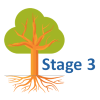A few years back the winning t-shirt design in a contest for the American Association of Public Opinion Research read “Weighting is the Hardest Part.” And I don’t think the t-shirt was referring to  anything about patience!
anything about patience!
Most statistical methods assume that every individual in the sample has the same chance of selection.
Complex Sample Surveys are different. They use multistage sampling designs that include stratification and cluster sampling. As a result, the assumption that every selected unit has the same chance of selection is not true.
To get statistical estimates that accurately reflect the population, cases in these samples need to be weighted. If not, all statistical estimates and their standard errors will be biased.
But selection probabilities are only part of weighting. (more…)
Author: Trent Buskirk, PhD.
As it is in history, literature, criminology and many other areas, context is important in statistics. Knowing from where your data comes gives clues about what you can do with that data and what inferences you can make from it.
In survey samples context is critical because it informs you about how the sample was selected and from what population it was selected. (more…)
In our last article, we talked about simple random samples. Simple random samples are, well…simple, but they’re not always optimal or even possible.
Probability samples that don’t meet the assumptions of Simple Random Samples are called Complex Samples.
You’ll also hear the term Complex Survey, which is really just a survey that incorporates some sort of complex sampling design. Because of their size and research goals, surveys are usually* the only type of research study that uses complex samples.
(*but not always. I have seen intervention studies, for example, that used complex sampling).
What is a Complex Sample?
The most defining feature of a complex sample is that sample members do not have equal probability of being selected.
That sounds simple enough. But… (more…)
Complex Surveys use a sampling technique other than a simple random sample. Terms you may have heard in this area include cluster sampling, stratified sampling, oversampling, two-stage  sampling, and primary sampling unit.
sampling, and primary sampling unit.
Complex Samples require statistical methods that take the exact sampling design into account to ensure accurate results.
In this webinar, guest instructor Dr. Trent Buskirk will give you an overview of the common sampling techniques and their effects on data analysis.
Note: This training is an exclusive benefit to members of the Statistically Speaking Membership Program and part of the Stat’s Amore Trainings Series. Each Stat’s Amore Training is approximately 90 minutes long.
About the Instructor

Trent D. Buskirk, Ph.D. is the Vice President of Statistics and Methodology, Marketing Systems Group.
Dr. Buskirk has more than 15 years of professional and academic experience in the fields of survey research, statistics, as well as SPSS, SAS, and R.
Dr. Buskirk has taught for more than a decade at the University of Nebraska and Saint Louis University where he was an Associate Professor of Biostatistics in the School of Public Health.
Not a Member Yet?
It’s never too early to set yourself up for successful analysis with support and training from expert statisticians.
Just head over and sign up for Statistically Speaking.
You'll get access to this training webinar, 130+ other stats trainings, a pathway to work through the trainings that you need — plus the expert guidance you need to build statistical skill with live Q&A sessions and an ask-a-mentor forum.
Like any applied skill, mastering statistical analysis requires:
1. building a body of knowledge
2. adeptness of the tools of the trade (aka software package)
3. practice applying the knowledge and using the tools in a realistic, meaningful context.
If you think of other high-level skills you’ve mastered in your life–teaching, survey design, programming, sailing, landscaping, anything–you’ll realize the same three requirements apply.
These three requirements need to be developed over time–over many years to attain mastery. And they need to be developed together. Having more background knowledge improves understanding of how the tools work, and helps the practice go better. Likewise, practice in a real context (not perfect textbook examples) makes the knowledge make more sense, and improves skills with the tools.
I don’t know if this is true of other applied skills, but from what I’ve seen over many years of working with researchers as they master statistical analysis, the journey seems to have 3 stages. Within each stage, developing all 3 requirements–knowledge, tools, and experience–to a level of mastery sets you up well for the next stage. (more…)
 anything about patience!
anything about patience!
